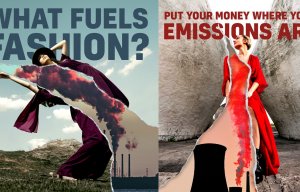
Brands are falling short, says Fashion Revolution
Most major brands still not disclosing their annual production volumes, study finds.

17th July 2023
Innovation in Textiles
|
London
The fashion industry still has a long way to go to address global inequality and the climate crisis, according to the latest Fashion Transparency Index, published by UK-based Fashion Revolution, which claims to be the world’s largest fashion activism movement,
Its Fashion Transparency Index analyses and ranks 250 of the world’s biggest fashion brands and retailers based on their public disclosure of human rights and environmental policies, practices and impacts, both in their operations and in their supply chains.
Brands are selected on the basis of an annual turnover over $400 million and represent a spread of market segments including high street, luxury, sportswear, accessories, footwear and denim from across Europe, North America, South America, Asia and Africa.
Unimpressive
On the whole, the index finds that the global fashion industry has made unimpressive progress on transparency with major brands achieving an overall average score of 26%, up just 2% from last year. While it is clear that much of the industry is lagging behind on transparency, there were some moves in the right direction. Finally for example, more than half (52%) of the 250 major brands reviewed are disclosing their first tier supplier lists – a promising shift compared to 32 out of 100 brands (32%) in the first edition of the index published in 2017.
In another important milestone, a luxury brand is among the top scoring brands for the first time – Italian luxury fashion house Gucci ranked second out of 250 brands, with an overall average score of 80%. After years of the luxury fashion sector dragging its feet on transparency, the five biggest movers this year are all luxury brands (Gucci, Armani, Jil Sander, Miu Miu and Prada), with the biggest increase being Gucci by 21 percentage points. This demonstrates that big strides in transparency are achievable if there is the will.
Worrisome
“As activists, it is maddening to have to continually push for what ultimately is the bare minimum of what we should expect from major fashion brands,” says Liv Simpliciano, Fashion Revolution’s policy and research manager. “The unimpressive progress here is worrisome in the face of deepening social inequality, environmental destruction and various incoming legislations. We are pleased that a minority of brands are finally scoring 80% or higher but even 100% transparency is only the starting point and it seems many major fashion brands have yet to even show up to the race. Time is running out and yet most of the fashion industry continues to dig its heels in and refuse to change. We cannot shop our way out of the climate crisis, we cannot recycle our way out of overproduction and frankly, there is no fashion on a dead planet.”
Chief among findings from the index are:
- The overwhelming majority (99%) of major fashion brands do not disclose the number of workers in their supply chains being paid a living wage rate.
- 94% of major fashion brands still don’t disclose what fuel is used in the manufacturing of their clothes.
- Despite upcoming legislation to mitigate fashion waste, most major brands do not disclose their annual production volumes nor do they commit to reducing the number of new items they produce.
- Major fashion brands continue to shirk responsibilities like tax and purchasing practices driving inequalities within the industry, while only 18% of major brands disclose the percentage of executive bonus or pay tied to sustainability targets.
- Few major fashion brands have published commitments to zero deforestation.
Highest scoring
For the first time in 2023, two brands scored 80% or higher. Italian brand OVS scored highest again this year with 83%, followed by Gucci at 80% and then Kmart Australia and Target Australia at 76%. OVS has increased its score by 5 percentage points since last year, Gucci by 21 percentage points and Kmart and Target Australia’s scores are lower by two percentage points.
Lowest scoring
Alongside record highs this year, 18 major brands score a 0% rating, up from 15 brands last year: ANTA, Belle, Big Bazaar, Bosideng, Fashion Nova, K-Way, KOOVs, Max Mara, Metersbonwe, Mexx, New Yorker, Heilan Home, Savage x Fenty, Semir, Splash, Tom Ford, Van Heusen and Youngor. All in all, 28% scored in the 0-10% range.
The full report can be accessed here.

Business intelligence for the fibre, textiles and apparel industries: technologies, innovations, markets, investments, trade policy, sourcing, strategy...
Find out more